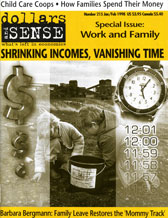Active Culture
Revolution on the Airwaves
This article is from the January/February 1998 issue of Dollars and Sense: The Magazine of Economic Justice available at http://www.dollarsandsense.org
This article is from the January/February 1998 issue of Dollars & Sense magazine.

Just when you thought access to the media is lost for good to the likes of Time Warner and Disney, activists in the Bay Area are taking the airwaves back. By means of micropowered radio, stations like Free Radio Berkeley (104.1 FM), San Francisco Liberation Radio (93.7 FM), and Radio Libre (103.3 FM), and activists broadcasting from San Rafael (88.1 FM), Sausalito (87.9 FM), Santa Cruz (89 FM), and Salinas (96.3 FM) are all vying for a voice amid the corporate media monopoly.
These unlicensed broadcasters operate in defiance of the Federal Communications Commission, which seems most interested in protecting big broadcasting interests. The FCC doesn't grant FM broadcasting licenses for less than 100 watts. Most micro-powered stations broadcast at around 10 watts. What this means for the average community member who wants to participate in the free exchange of ideas on the airwaves is simple: she can't. That is unless she has a spare $100,000 for start up costs. And to make sure broadcasters conform to regulations, under the Telecommunications Act of 1996 the FCC reserves the right to slap a $10,000 a day fine on the "offenders." Micro-powered broadcasters also risk sanctions of up to $100,000 for broadcasting without a license.
These threats aren't silencing the voice of Free Radio Berkeley's Stephen Dunifer, who is currently awaiting a court decision on a motion brought forward by the FCC to shut Free Radio Berkeley down. Says Dunifer, "The whole point is for the community to have a voice... What we're looking for is a deregulated and accessible FM band." Free Radio Berkeley is challenging the FCC structure that prohibits all but wealthy individuals and corporations from having access to radio bands. Not only does FRB broadcast quality programming with a focus on the community, be it political or not, they also provide support and resources for other democratizers of the airwaves. For $55 you can purchase one of Dunifer's start up kits, and with an additional $1000 for hardware you can hit the air. Dunifer envisions "tens of thousands of micro-powered stations flowering across the country."
Large media corporations are the primary shapers of American opinion. Confronting this corporate hegemony remains one of the largest obstacles activists face today. "The only people standing in the way," says Dunifer, "are the corporate giants and their government representative, the FCC." Tough battle? Maybe. But since when have grassroots activists been daunted by government or big business? Free Radio Berkeley, (510) 464-3041 (www.freeradio.org)
For Stephen Dunifer and Ron Sakoslosky's new book, Seizing the Airwaves, call 1-888-4-AKPRESS.
Fighting the Deluge
Are your relationships with family, friends, and community drowning in the deluge of too much work? Or are you one of the under- or un-employed, barely scraping enough cash together to pay for the essentials? Throughout the 90s, the Shorter Work-Time Group, a loosely-organized network based in Boston, has been trying to stimulate public discussion of government policies that would solve your worsening time, and money, crunch.
"Too much work for some of us, unemployment or underemployment for others" contributes to people's fading physical, mental, and emotional health, argues Barbara Brandt, editor of the group's newsletter. In a time when business is promoting more overtime and "undertime," the group distributes information that women's, workers', and professional groups can use to challenge the belief that we have to enslave ourselves to our jobs in order to keep the U.S. economy "competitive."
A ten-point plan the group helped devise was first submitted as a bill in Congress in 1991 but still hasn't made the front page. It includes: a standard 6-hour work day and 30-hour full-time week, with no loss in pay; mandatory paid vacations for all workers; improved family-leave policies; benefits for all workers, whether full- or part-time or temporary; regulations discouraging overtime; and more flexible working arrangements.
